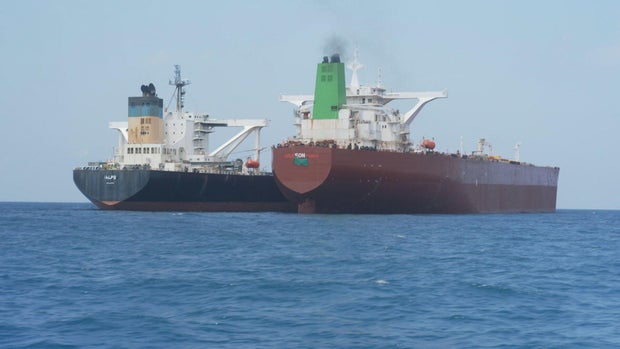A CBS News investigation has revealed that China is still secretly buying Iranian oil and evading U.S. sanctions by using what’s known as a “dark fleet” to transfer oil from ship to ship in the middle of the sea.
Over the years, the U.S. has implemented heavy sanctions on Iranian industries, including trying to stop tankers used to transfer Iranian oil to China, which could help fund Iranian nuclear development programs. On Wednesday, the Treasury Department imposed additional sanctions, which Washington called the most extensive action of its kind since 2018.
Recently, a CBS News crew set off from Singapore, one of the busiest shipping ports in the world, to head more than 80 nautical miles away in international waters to see how the “dark fleet” operates.
“As long as there’s a supply, there will be a demand for this discounted oil,” said Charlie Brown, a former U.S. Navy officer who’s now a senior adviser with United Against Nuclear Iran, who is advising the U.S. government.
The supply is Iran, the demand is China, and this mutually beneficial relationship, which has long angered the United States, plays out off the coast of Malaysia in the Riau archipelago, an area the size of New York City.
“This is ‘dark fleet’ parking central,” said Brown, who’s been monitoring the “dark fleet” for years.
He described one ship, the Tifani, as “a well-known ‘dark fleet’ tanker that’s always been out here on a regular basis.”
The tankers, full of oil, sail from the Persian Gulf through the Strait of Malacca to the Riau archipelago. There, they transfer the crude to ships bound for China, which buys 90% of Iran’s oil.
CBS
During the CBS News crew’s journey, four ship-to-ship transfers were happening in plain sight.
These “dark fleet” tankers — all with their transponders switched off — clearly do not want to be identified.
“Both ships have a net or something, a tarp, deployed over the stern, covering the name and identification number — it’s obvious deceptive practice,” Brown said.
Further analysis revealed one ship was the elusive Stellar Oracle, laden with Iranian oil. It was placed on the U.S. sanctions list in May.
Close by, another ship-to-ship transfer was underway involving the Alps — not its real name — filled with Iranian crude that was also sanctioned in May. The receiving vessel Eon, which is not on any list, was caught in the act — a new sanctions violator.
CBS
According to a congressional report last year, this trade generated as much as $70 billion for Iran, propping up the regime and its nuclear weapons program. The Trump administration has imposed multiple rounds of sanctions on this trade this year, but it’s having little effect. China doesn’t recognize the unilateral U.S. sanctions on Iran and says that its trade with Iran is legitimate.
By the end of the day, 12 ship-to-ship transfers were recorded in the Riau archipelago — an unprecedented number and a clear indication Iran and China are only ramping up this illicit activity.

